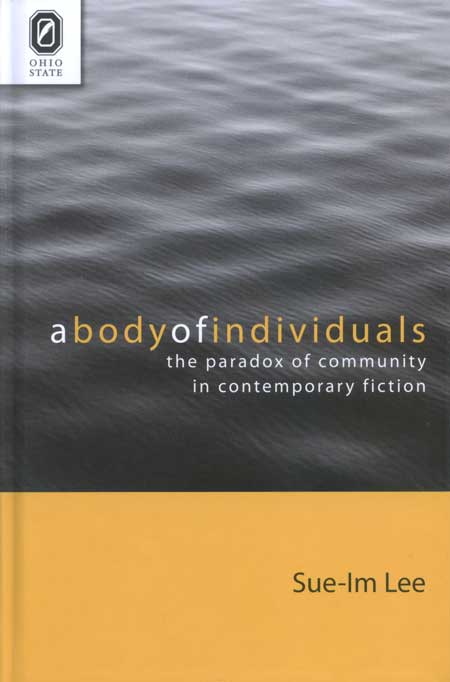A Body of IndividualsThe Paradox of Community in Contemporary FictionSue-Im Lee |
 Feb 2009 Literary Criticism/American/General 196 pp. 6x9  $29.95 paper 978-0-8142-5662-6 Add paper to shopping cart $32.95 PDF ebook 978-0-8142-7963-2 Add PDF ebook to shopping cart Shopping Cart Instructions Review/Change Shopping Cart & Check-out | |||
|
read excerpts from
the book • |
“Sue-Im Lee’s A Body of Individuals is a work with a sharp and immediately apparent focus that keeps developing its idea in fresh ways all the way to the end. Each of her chapters takes a distinct and fresh approach to the subject of community, and together they reveal a common thread running through discussions in remote disciplines and on seemingly disparate topics. She consistently relates her discussion to other important theoretical and scholarly studies, some of which deal with historically specific literary communities or relationships and others which deal with the relationship of writing to community more generally. It is both a highly readable and exceptionally well-informed work that investigates contemporary fiction in an original way.” —R. M. Berry, professor and chair of English, Florida State University “Lee is a superlative writer. Her sentences are wonderfully readable; her ability to move between the theoretical positions and the literature produces convincing arguments; and the overall organization of the book avoids the kinds of repetition that are so often part of books that track a series of writers. I strongly recommend A Body of Individuals to scholars and students in poststructuralist theory, contemporary American literature, and community theory.” —Dennis Foster, D. D. Frensley Chair in English Literature, Southern Methodist University Why are some versions of the collective “we” admired and desired while other versions are scorned and feared? A Body of Individuals: The Paradox of Community in Contemporary Fiction examines the conflict over the collective “we” through discourses of community. In the discourse of benevolent community, community is a tool towards achieving healing, productiveness, and connection. In the discourse of dissenting community, community that serves a function is simply another name for totalitarianism; instead, community must merely be a fact of coexistence. What are the sources and the appeal of these irreconcilable views of community, and how do they interact in contemporary fiction’s attempt at imagining “we”? By engaging contemporary U.S. writers such as Toni Morrison, Richard Powers, Karen Tei Yamashita, Lydia Davis, Lynne Tillman, and David Markson with theorists such as Jean-Luc Nancy, Giorgio Agamben, François Lyotard, Ernesto Laclau, Louis Althusser, Roland Barthes, and Ludwig Wittgenstein, this book reveals how the two conflicting discourses of community—benevolent and dissenting—are inextricably intertwined in various literary visions of “we”—“we” of the family, of the world, of the human, and of coexistence. These literary visions demonstrate, in a way that popular visions of community and postmodern theories of community cannot, the dialectical relationship between the discourses of benevolent community and dissenting community. Sue-Im Lee argues that contemporary fiction’s inability to resolve the paradox results in a model of ambivalent community, one that offers unique insights into community and into the very notion of unity. Sue-Im Lee is assistant professor of English at Temple University. | |||

